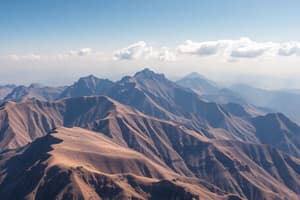Podcast
Questions and Answers
What is a primary focus of physical geography?
What is a primary focus of physical geography?
- Study of cultural practices
- Natural features and processes of the Earth (correct)
- Political structures and influences
- Human demographic trends
Which component is not part of human geography?
Which component is not part of human geography?
- Economic Geography
- Urban Geography
- Soil Geography (correct)
- Population Geography
Which aspect is included in environmental geography?
Which aspect is included in environmental geography?
- Cultural beliefs and practices
- Distribution of languages
- Management and conservation of natural resources (correct)
- Economic activities in urban areas
What does cultural geography primarily examine?
What does cultural geography primarily examine?
Which concept is key to understanding human-environment interaction?
Which concept is key to understanding human-environment interaction?
Which of the following is a key component of biogeography?
Which of the following is a key component of biogeography?
Which area is NOT typically studied within urban geography?
Which area is NOT typically studied within urban geography?
Which topic would likely fall under the realm of environmental issues?
Which topic would likely fall under the realm of environmental issues?
What concept describes the distribution and impact of languages?
What concept describes the distribution and impact of languages?
What is the primary concern of political geography?
What is the primary concern of political geography?
Study Notes
Physical Geography
- Definition: Study of natural features and processes of the Earth.
- Key Components:
- Landforms: Mountains, valleys, plains, plateaus.
- Climate: Patterns of temperature and precipitation affecting ecosystems.
- Hydrology: Distribution and movement of water, including rivers, lakes, and oceans.
- Biogeography: Distribution of species and ecosystems across geographical locations.
- Soil Geography: Study of soil types, formation, and distribution.
Human Geography
- Definition: Study of human activities and their relationship with the environment.
- Key Components:
- Population Geography: Distribution, density, and demographics of populations.
- Urban Geography: Structure and function of cities and urban spaces.
- Economic Geography: Spatial aspects of economic activities, trade, and resources.
- Political Geography: Relationship between geographic space and political processes.
- Cultural Geography: How cultural practices and identities are shaped by and influence geographical areas.
Environmental Geography
- Definition: Intersection of physical and human geography, focusing on human impact on the environment.
- Key Components:
- Sustainability: Practices that promote the health of the environment for future generations.
- Natural Resources: Management and conservation of resources like water, minerals, and forests.
- Environmental Issues: Climate change, pollution, deforestation, and biodiversity loss.
- Human-Environment Interaction: How societies adapt to and modify their environments.
Cultural Geography
- Definition: Study of cultural practices, beliefs, and their spatial manifestations.
- Key Components:
- Language: Distribution and impact of languages on culture and identity.
- Religion: Influence of religious beliefs on cultural landscapes and practices.
- Tradition and Customs: How historical practices shape contemporary cultural identities.
- Cultural Landscapes: Physical manifestations of cultural practices, including architecture and land use.
- Globalization: Interaction and integration of cultures through trade, communication, and migration.
Physical Geography
- Focuses on natural features and processes of Earth, examining landforms, climate, hydrology, biogeography, and soil.
- Landforms: Includes diverse geographical shapes such as mountains, valleys, plains, and plateaus.
- Climate: Analyzes temperature and precipitation patterns that influence ecosystems globally.
- Hydrology: Studies the distribution and flow of water bodies, encompassing rivers, lakes, and oceans.
- Biogeography: Investigates how species and ecosystems are distributed across geographical areas.
- Soil Geography: Examines types of soil, their formation processes, and distribution patterns.
Human Geography
- Explores human activities and their interplay with the environment through various dimensions.
- Population Geography: Analyzes population distribution, density, and demographic characteristics.
- Urban Geography: Focuses on the layout, function, and organization of cities and urban areas.
- Economic Geography: Studies spatial dynamics of economic activities, including trade and resource allocation.
- Political Geography: Investigates the effects of geography on political processes and territorial governance.
- Cultural Geography: Explores how cultural identities and practices are shaped by geographical contexts.
Environmental Geography
- Examines the synergy between physical and human geography, particularly regarding environmental impacts.
- Sustainability: Advocates for practices that ensure environmental health for future generations.
- Natural Resources: Focuses on the management and conservation of essential resources like water and minerals.
- Environmental Issues: Addresses contemporary challenges such as climate change, pollution, deforestation, and biodiversity decline.
- Human-Environment Interaction: Studies how societies adapt to and alter their environments to meet needs.
Cultural Geography
- Investigates cultural practices and beliefs, and how they manifest spatially across regions.
- Language: Examines the geographical distribution of languages and their influence on culture and identity.
- Religion: Analyzes how religious beliefs shape cultural landscapes and practices worldwide.
- Tradition and Customs: Explores how historical practices inform and shape modern cultural identities.
- Cultural Landscapes: Studies physical expressions of culture through architecture, land use, and other societal artifacts.
- Globalization: Investigates the interaction and integration of diverse cultures through economic trade, communication, and migration.
Studying That Suits You
Use AI to generate personalized quizzes and flashcards to suit your learning preferences.
Description
Explore the fundamental concepts of Physical and Human Geography. This quiz covers key components such as landforms, climate, population dynamics, and urban development. Test your knowledge on how human activities interact with the environment and the natural processes that shape our world.



